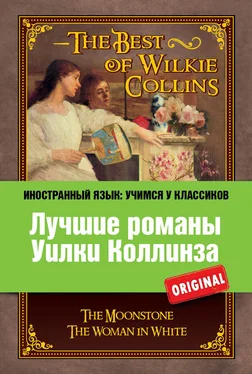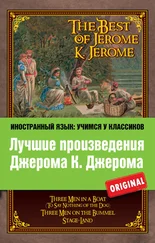“You are, in every way, Mr. Gilmore, much fitter to advise and to act in the matter than I am. Is it an indiscretion on my part to ask if you have decided yet on a course of proceeding?”
“So far as it is possible to decide, Mr. Hartright, I have decided. I mean to send a copy of the letter, accompanied by a statement of the circumstances, to Sir Percival Glyde’s solicitor in London, with whom I have some acquaintance. The letter itself I shall keep here to show to Sir Percival as soon as he arrives. The tracing of the two women I have already provided for, by sending one of Mr. Fairlie’s servants – a confidential person – to the station to make inquiries. The man has his money and his directions, and he will follow the women in the event of his finding any clue. This is all that can be done until Sir Percival comes on Monday. I have no doubt myself that every explanation which can be expected from a gentleman and a man of honour, he will readily give. Sir Percival stands very high, sir – an eminent position, a reputation above suspicion – I feel quite easy about results – quite easy, I am rejoiced to assure you. Things of this sort happen constantly in my experience. Anonymous letters – unfortunate woman – sad state of society. I don’t deny that there are peculiar complications in this case; but the case itself is, most unhappily, common – common.”
“I am afraid, Mr. Gilmore, I have the misfortune to differ from you in the view I take of the case.”
“Just so, my dear sir – just so. I am an old man, and I take the practical view. You are a young man, and you take the romantic view. Let us not dispute about our views. I live professionally in an atmosphere of disputation, Mr. Hartright, and I am only too glad to escape from it, as I am escaping here. We will wait for events – yes, yes, yes – we will wait for events. Charming place this. Good shooting? Probably not, none of Mr. Fairlie’s land is preserved, I think. Charming place, though, and delightful people. You draw and paint, I hear, Mr. Hartright? Enviable accomplishment. What style?”
We dropped into general conversation, or rather, Mr. Gilmore talked and I listened. My attention was far from him, and from the topics on which he discoursed so fluently. The solitary walk of the last two hours had wrought its effect on me – it had set the idea in my mind of hastening my departure from Limmeridge House. Why should I prolong the hard trial of saying farewell by one unnecessary minute? What further service was required of me by any one? There was no useful purpose to be served by my stay in Cumberland – there was no restriction of time in the permission to leave which my employer had granted to me. Why not end it there and then?
I determined to end it. There were some hours of daylight still left – there was no reason why my journey back to London should not begin on that afternoon. I made the first civil excuse that occurred to me for leaving Mr. Gilmore, and returned at once to the house.
On my way up to my own room I met Miss Halcombe on the stairs. She saw, by the hurry of my movements and the change in my manner, that I had some new purpose in view, and asked what had happened.
I told her the reasons which induced me to think of hastening my departure, exactly as I have told them here.
“No, no,” she said, earnestly and kindly, “leave us like a friend – break bread with us once more. Stay here and dine, stay here and help us to spend our last evening with you as happily, as like our first evenings, as we can. It is my invitation – Mrs. Vesey’s invitation – ” she hesitated a little, and then added, “Laura’s invitation as well.”
I promised to remain. God knows I had no wish to leave even the shadow of a sorrowful impression with any one of them.
My own room was the best place for me till the dinner bell rang. I waited there till it was time to go downstairs.
I had not spoken to Miss Fairlie – I had not even seen her – all that day. The first meeting with her, when I entered the drawing-room, was a hard trial to her self-control and to mine. She, too, had done her best to make our last evening renew the golden bygone time – the time that could never come again. She had put on the dress which I used to admire more than any other that she possessed – a dark blue silk, trimmed quaintly and prettily with old-fashioned lace; she came forward to meet me with her former readiness – she gave me her hand with the frank, innocent good-will of happier days. The cold fingers that trembled round mine – the pale cheeks with a bright red spot burning in the midst of them – the faint smile that struggled to live on her lips and died away from them while I looked at it, told me at what sacrifice of herself her outward composure was maintained. My heart could take her no closer to me, or I should have loved her then as I had never loved her yet.
Mr. Gilmore was a great assistance to us. He was in high good-humour, and he led the conversation with unflagging spirit. Miss Halcombe seconded him resolutely, and I did all I could to follow her example. The kind blue eyes, whose slightest changes of expression I had learnt to interpret so well, looked at me appealingly when we first sat down to table. Help my sister – the sweet anxious face seemed to say – help my sister, and you will help me.
We got through the dinner, to all outward appearance at least, happily enough. When the ladies had risen from table, and Mr. Gilmore and I were left alone in the dining-room, a new interest presented itself to occupy our attention, and to give me an opportunity of quieting myself by a few minutes of needful and welcome silence. The servant who had been despatched to trace Anne Catherick and Mrs. Clements returned with his report, and was shown into the dining-room immediately.
“Well,” said Mr. Gilmore, “what have you found out?”
“I have found out, sir,” answered the man, “that both the women took tickets at our station here for Carlisle.”
“You went to Carlisle, of course, when you heard that?”
“I did, sir, but I am sorry to say I could find no further trace of them.”
“You inquired at the railway?”
“Yes, sir.”
“And at the different inns?”
“Yes, sir.”
“And you left the statement I wrote for you at the police station?”
“I did, sir.”
“Well, my friend, you have done all you could, and I have done all I could, and there the matter must rest till further notice. We have played our trump cards, Mr. Hartright,” continued the old gentleman when the servant had withdrawn. “For the present, at least, the women have outmanoeuvred us, and our only resource now is to wait till Sir Percival Glyde comes here on Monday next. Won’t you fill your glass again? Good bottle of port, that – sound, substantial, old wine. I have got better in my own cellar, though.”
We returned to the drawing-room – the room in which the happiest evenings of my life had been passed – the room which, after this last night, I was never to see again. Its aspect was altered since the days had shortened and the weather had grown cold. The glass doors on the terrace side were closed, and hidden by thick curtains. Instead of the soft twilight obscurity, in which we used to sit, the bright radiant glow of lamplight now dazzled my eyes. All was changed – indoors and out all was changed.
Miss Halcombe and Mr. Gilmore sat down together at the card-table – Mrs. Vesey took her customary chair. There was no restraint on the disposal of THEIR evening, and I felt the restraint on the disposal of mine all the more painfully from observing it. I saw Miss Fairlie lingering near the music-stand. The time had been when I might have joined her there. I waited irresolutely – I knew neither where to go nor what to do next. She cast one quick glance at me, took a piece of music suddenly from the stand, and came towards me of her own accord.
Читать дальше
Конец ознакомительного отрывка
Купить книгу












